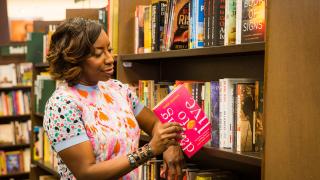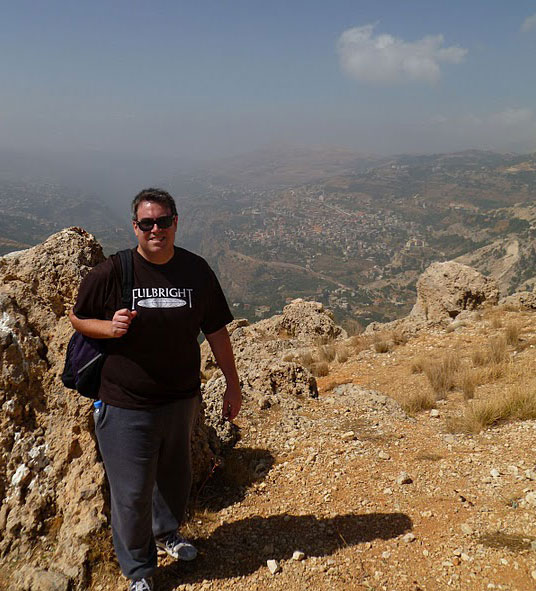
William DeGenaro, associate professor of composition and rhetoric at UM-Dearborn, is spending an academic year teaching and conducting research at the American University of Beirut (AUB), one of the oldest and best known institutions of higher education in the Arab world.
DeGenaro’s year abroad is made possible by a Fulbright award he received from the Council for International Exchange of Scholars, which administers the award under a cooperative agreement with the United States Department of State.
Fulbright recipients are selected on the basis of academic or professional achievement and the demonstration of unusual leadership potential in their fields. They are given opportunities to study, teach and conduct research, exchange ideas and contribute to finding solutions to shared international concerns, according to the Fulbright website.
“I'm learning a lot about Lebanese culture, and Arab culture in general. The Lebanese are very warm and hospitable. My wife and I have made some good friends and we've even had students of mine invite us to their homes for meals,” said DeGenaro, in an e-mail from Beirut. “It's definitely a once in a lifetime chance to experience the beauty, culture and history of the Arab world.”
His Fulbright, which runs through May, covers living and travel expenses for DeGenaro and his wife Nicole, an attorney who is spending the year working at a human rights organization in Beirut that advocates for women in the Middle East.
At AUB, DeGenaro has been teaching first-year writing (the equivalent of UM-Dearborn's Composition 105/106 courses), and taught a graduate class focused on teaching methods last fall.
He’s also conducting two research projects while at AUB. The first focuses on a student-volunteer, literacy initiative in which AUB undergraduates teach English to University staff (mostly janitors and public safety officers).
“The program is impressive on many levels, mainly because AUB students run the whole operation, advertising the program, organizing logistics like rooms and supplies and textbooks, and most importantly teaching,” said DeGenaro, who is blogging about his Beirut experiences at beirutbill.blogspot.com. “I'm observing the instruction and interviewing the undergraduates about why they are choosing to devote so much of their time to this initiative. I hope to write a full-length ethnography based on my participant-observations and explore what I think American college students can learn from this ambitious undertaking.”
The second project is a teacher-research project with Prof. Margaret Willard-Traub, director of UM-Dearborn's Writing Program.
“In the fall, we linked Professor Willard-Traub's students with my students in Beirut who interviewed each other on Skype and Facebook about issues related to literacy: reading and writing habits, multi-lingualism, experiences with technology, etc.,” he said. “The students composed ‘literacy narratives’ about one another and made good friends in the process. Margaret and I are now analyzing their writing projects and writing a report about the whole experience.”
In May, Willard-Traub will join DeGenaro in Beirut to give a lecture at AUB about their work and findings.
DeGenaro said the Fulbright award has given him the opportunity to better understand the context out of which so many UM-Dearborn students come.
“Each term at UM-Dearborn, I meet students who grew up in Lebanon, or whose families live here, or who go back to visit their villages and rave about life here,” DeGenaro said. “I'm not Lebanese, but I think I now have a more informed sense of what makes those students who they are--and what makes them love Lebanon too.”
When he returns to UM-Dearborn, DeGenaro hopes to continue linking Dearborn and Beirut--two diverse, cosmopolitan cities--through writing courses.
“Dearborn and Beirut have so much in common: bilingualism, bi-culturalism, families working to maintain Arab traditions while succeeding in our globalized world. I think students at both institutions benefit from more personal, critical and informed understandings of ‘the other,’ and so I like the idea of continuing to use the classroom as a place to foster this type of understanding,” he said.
“It's safe to say my research agenda has turned a corner due to this experience. I've always been focused on the teaching of writing and issues of identity politics but now I have a broader base,” DeGenaro said. “Put differently, I have new data and new ideas and I hope to spend the year or two years after I return writing about things like civic engagement among Beirut college students and how the teaching of writing can benefit from a global focus.”
####






